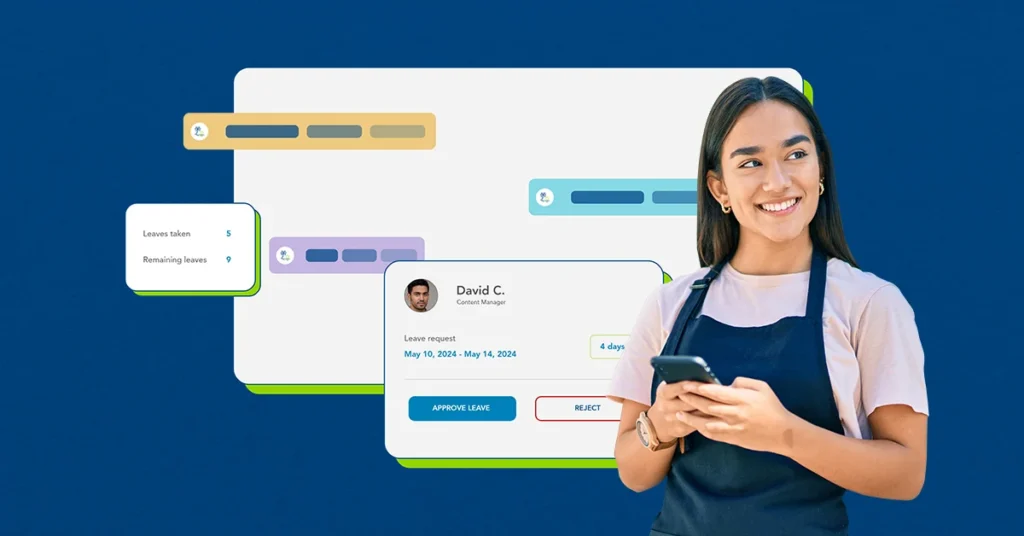Overtime pay can seem straightforward. Work extra, earn extra, right?
But the reality is layered with legal requirements, calculations, and risks. Keeping in line with both employment law and your employees (because who likes their paychecks messed up) means overtime pay isn’t something you can overlook.
Whether you’re managing HR, overseeing payroll, or coordinating an entire department, overtime pay impacts every function’s efficiency and compliance. This guide walks you through everything you need to know about overtime pay: calculations, exemptions, laws, etc.
If you want to manage your policies better, confirm overtime pay accuracy, and protect your organization from unnecessary risks, keep reading.
What is overtime pay?
Overtime pay is additional compensation for employees who work beyond a set number of hours, usually over 40 in a workweek. The Fair Labor Standards Act (FLSA) governs this at the federal level, setting baseline requirements, but many states have their own overtime laws.
What is the overtime pay rate?
The standard federal overtime rate is 1.5 times (1.5x) the employee’s regular rate after 40 hours in a workweek. However, some state laws and collective bargaining agreements (CBAs) require higher rates or trigger overtime under additional conditions, such as daily thresholds.
Types of overtime pay
Overtime doesn’t always look the same across states or organizations. Here’s what you need to know:
- Weekly overtime – Triggered after 40 hours a week (FLSA standard).
- Daily overtime – States like California require overtime after 8 hours daily.
- Double time – Paying 2x the employee’s standard rate, rather than the 1.5x overtime rate. Not enforced by the FLSA, but some unions and CBAs may include it as an added benefit.
- Voluntary time – Overtime work offered by an employer that an employee can accept or decline without penalty. Employees who accept receive full overtime pay.
- Time off in lieu (TOIL) – Also known as compensatory (comp) time, employees get overtime compensation in the form of paid time off (PTO), instead of extra pay. This is subject to employer policies and regulations, as scheduled and agreed on by the employer and employee.
- 7th day overtime – Some states require overtime or double time pay for employees who work seven consecutive days, starting on the 7th day.
- Compulsory time – Also known as mandatory overtime, occurs when employees are required to work overtime due to essential business needs, such as emergencies or operational timelines.
Knowing what you’re liable for with the type of overtime pay is your first step in overtime compliance as an employer.
Who has to pay overtime?
Businesses under FLSA regulations and are required to pay overtime include:
- Businesses with annual gross sales greater than $500,000; or
- Hospitals, institutions for the sick, elderly, mentally incapable/disabled, physically disabled, preschools, elementary/secondary schools, and higher education institutions (for profit or not); or
- Public agencies or organizations producing an activity of such
How does overtime pay work?
Think of overtime as a sequence. Understanding how overtime pay works starts with who qualifies and how rates are applied. First, employers must establish whether an employee is categorized as exempt or nonexempt.
These classifications then dictate whether overtime rules apply. From there, the types of classifications — rates, hours, and eligibility — all follow suit and create the bigger picture.
Overtime exempt employees
Workers exempt from overtime must make at least twice the minimum wage in their area, are paid greater than $684 per week ($35,568 annually) salaried, and fulfill certain job duties. These duties are typically executive, administrative, or professional, like managing at least two other employees and/or having the authority to hire or fire employees.
A few job categories of exempt employees include:
- Executive
- Administrative
- Computer
- Outside Sales
- Highly-compensated
Can a salaried employee get overtime pay?
Yes, if they’re nonexempt. Salaried status doesn’t automatically mean exemption. Employers must apply the FLSA’s job duty and income tests to determine eligibility.
Nonexempt employees (H3)
These workers can receive overtime pay if they earn the hourly minimum wage and hit the overtime pay period threshold as previously described. Here are some examples of nonexempt positions:
- Administrative assistants
- Contractors
- Retail associates
- Hospitality roles
- Construction workers
Is overtime pay taxed at a higher rate?
No, overtime pay is taxed at the same rates as regular earnings. Employees need to consider its effect on gross annual income, however, as overtime’s impact on paycheck size may push an employee into a higher withholding bracket temporarily.
How to calculate overtime pay
Calculating overtime pay, or often referred to as overtime premium pay, is relatively simple, but it involves following a few clear steps:
- Determine the regular hourly rate – For hourly workers, it’s straightforward. For salaried nonexempt employees, divide the weekly salary by 40 hours.
- Apply the overtime multiplier – Multiply the regular rate by 1.5 (or the required multiplier).
- Calculate total overtime premium pay – Multiply the overtime rate by the number of overtime hours worked.
- Calculate total pay for the period – Add the overtime pay calculation to the 40 hour standard pay period total (hourly rate x 40).
Overtime pay example
Let’s use hospitality as an example. Jenna worked 55 hours as a front desk receptionist at a hotel. She earns $20 per hour, she’s a nonexempt employee, and the hotel pays an overtime rate of time and a half (1.5).
Regular hourly pay rate: $20
Regular weekly wages: 40 hours at $20/hour = $800
Overtime worked: 15 hours (55 hours total worked-40 standard hours)
Overtime pay rate: $20 x 1.5 = $30
Total overtime pay: 15 hours (overtime hours) x $30 (overtime rate) = $450
Total pay: Regular weekly wages ($800) + overtime wages ($450) = $1,250
Beyond the math, overtime management requires accurate time tracking, correct classifications, and clear policies. Employers must:
- Record hours accurately
- Apply correct pay rates
- Include overtime in regular payroll cycles
Doing this for a few employees isn’t much to manage, but the larger the organization, the more complex this process can be. Time and attendance systems have become popular by helping simplify this process by automatically flagging overtime so employers can either a) reschedule to prevent excessive overtime or b) apply accurate rates automatically.
What is weighted overtime? Is it the same as blended overtime?
Calculating weighted overtime is necessary when employees work multiple jobs or pay rates within the same workweek. Weighted average overtime finds the average of the worker’s different pay rates as a base multiplier to eliminate the hassle of adding up overtime pay rates separately.
How to calculate weighted overtime
| Job | Hours Worked | Hourly Rate | Straight-Time Pay |
| A | 20 hours | $15.00 | 20 × $15 = $300.00 |
| B | 25 hours | $20.00 | 25 × $20 = $500.00 |
| Total = $800.00 |
Here’s the step-by-step calculation:
Step 1: Total Hours Worked – 20 (Job A) + 25 (Job B) = 45 hours
Step 2: Weighted Average Rate – $800/45 hours = $17.78/hr
Step 3: Overtime Hours – 45 – 40 = 5 overtime hours
Step 4: Overtime Premium (½ of weighted rate × OT) – 5 × ($17.78 ÷ 2) = $44.45
Step 5: Total Pay – $800 (straight time) + $44.45 (OT premium) = $844.45
When considering the nuances of weighted overtime versus standard overtime, you can see why it’s important to clarify which method your organization uses — even slight miscalculations in overtime pay can lead to legal ramifications.
Overtime pay laws by state
While the FLSA sets the national benchmark for overtime pay, state laws can add extra layers. For example, California and Alaska have more generous protections including daily overtime or double-time requirements, while others simply follow the federal baseline.
Does your organization have multi-state locations? Navigating overtime pay laws by state might sound complicated, but we’ve broken it down for you here.
Here’s a quick-reference snapshot (for the most up-to-date information and more details, refer to the U.S. Department of Labor state directory):
| State | Overtime Laws |
| Alabama | FLSA Only |
| Alaska | Daily – 8, Weekly – 40 |
| Arizona | FLSA Only |
| Arkansas | Weekly – 40 |
| California | Daily – 8 & 12, Weekly – 40, 7th Day |
| Colorado | Daily – 12, Weekly – 40 |
| Connecticut | Weekly – 40, 7th consecutive day (restaurants) |
| Delaware | FLSA Only |
| District of Columbia | Weekly – 40 |
| Florida | FLSA Only |
| Georgia | FLSA Only |
| Hawaii | Weekly – 40 |
| Idaho | FLSA Only |
| Illinois | Weekly – 40 |
| Indiana | Weekly – 40 |
| Iowa | FLSA Only |
| Kansas | FLSA Only |
| Kentucky | Weekly – 40, 7th Day |
| Louisiana | FLSA Only |
| Maine | Weekly – 40 |
| Maryland | Weekly – 40 |
| Massachusetts | Weekly – 40 |
| Michigan | Weekly – 40 |
| Minnesota | Weekly – 48 |
| Mississippi | FLSA Only |
| Missouri | Weekly – 40, 52 for seasonal businesses |
| Montana | Weekly – 40 |
| Nebraska | FLSA Only |
| Nevada | Daily – 8 (if <1.5x min wage), Weekly – 40 |
| New Hampshire | Weekly – 40 |
| New Jersey | Weekly – 40 |
| New Mexico | Weekly – 40 |
| New York | Weekly – 40, 44 for residential workers |
| North Carolina | Weekly – 40, 45 for seasonal businesses |
| North Dakota | Weekly – 40 |
| Ohio | Weekly – 40 |
| Oklahoma | FLSA Only |
| Oregon | Weekly – 40, Daily – 10 (certain industries) |
| Pennsylvania | Weekly – 40 |
| Rhode Island | Weekly – 40, Sundays & holidays (retail) |
| South Carolina | FLSA Only |
| South Dakota | FLSA Only |
| Tennessee | FLSA Only |
| Texas | FLSA Only |
| Utah | FLSA Only |
| Vermont | Weekly – 40 |
| Virginia | FLSA Only |
| Washington | Weekly – 40 |
| West Virginia | Weekly – 40 |
| Wisconsin | Weekly – 40 |
| Wyoming | FLSA Only |
Employer rights and clarifications with overtime pay
Even if you know the rules on the employment side of overtime, there’s still room for interpretation with some policies. We say this to establish that there are no stupid questions when it comes to getting overtime pay right.
Here are some key questions and answers about overtime pay as an employer.
Is it illegal not to pay overtime after 40 hours?
Yes, if the employee is nonexempt. Under the FLSA, covered employees must be paid time and a half for overtime — even if the employer didn’t pre-approve the extra hours.
Do employers have to pay overtime if it’s unapproved?
Yes. You can’t refuse to pay for time worked, even if it wasn’t pre-approved. However, you can discipline employees for violating scheduling policies — this protects employers from scheduling manipulation for more pay.
Can part-time employees get overtime pay?
Yes. Overtime rules apply to all nonexempt employees, regardless of whether they’re full-time or part-time. If a part-time employee exceeds 40 hours in a week, they’re entitled to overtime pay.
Can I get sued for not paying overtime?
Not to scare you, but absolutely. The FLSA specifically grants employees the right to bring private lawsuits against employers who fail to pay overtime or minimum wage.
Not only will you have to pay the missed wages if found liable, but you can also be responsible for double the wages in total damages, plus attorneys’ fees and court costs. In 2024 alone, back wage paybacks alone totaled over $250 million:
- Over $37.8 million for healthcare workers
- Over $32 million for construction workers
- Over $6.3 million for retail workers
How do companies get away with not paying overtime?
To be clear, no company is “getting away” on skipping overtime for long (at least when doing so illegally). Some companies may choose to only hire overtime-exempt employees as a strategy, or carefully manage employee scheduling to prevent avoidable overtime placements.
How overtime management software simplifies the process
Overtime pay is a type of payroll record and must be retained for at least three years in accordance with the FLSA. To support overtime recordkeeping compliance, you need accurate time tracking, calculations, and records for all overtime hours and pay.
TCP’s time and attendance solution, TimeClock Plus, doubles as overtime management software. You can easily monitor which employees are in or close to overtime thresholds, without the guesswork or catching it too late.
Need to calculate overtime? TCP makes it a breeze by automating it, no matter how complex your rules (including federal and state laws for overtime). Best of all, our software also works from the source — employee scheduling — to get ahead of overtime that might not be necessary.
Overtime shouldn’t cost you more than it already does in time and a half. You deserve a solution that takes care of your liability and your overtime payroll.
TCP Software’s employee scheduling and time and attendance solutions have the flexibility and scalability to suit your business and your employees, now and as you grow.
From TimeClock Plus, which automates even the most complex payroll calculations and leave management requests, to Humanity Schedule for dynamic employee scheduling that saves you time and money, we have everything you need to meet your organization’s needs, no matter how unique. Plus, with Aladtec, we offer 24/7 public safety scheduling solutions for your hometown heroes.
Ready to learn how TCP Software takes the pain out of employee scheduling and time tracking? Speak with an expert today.



